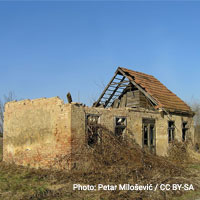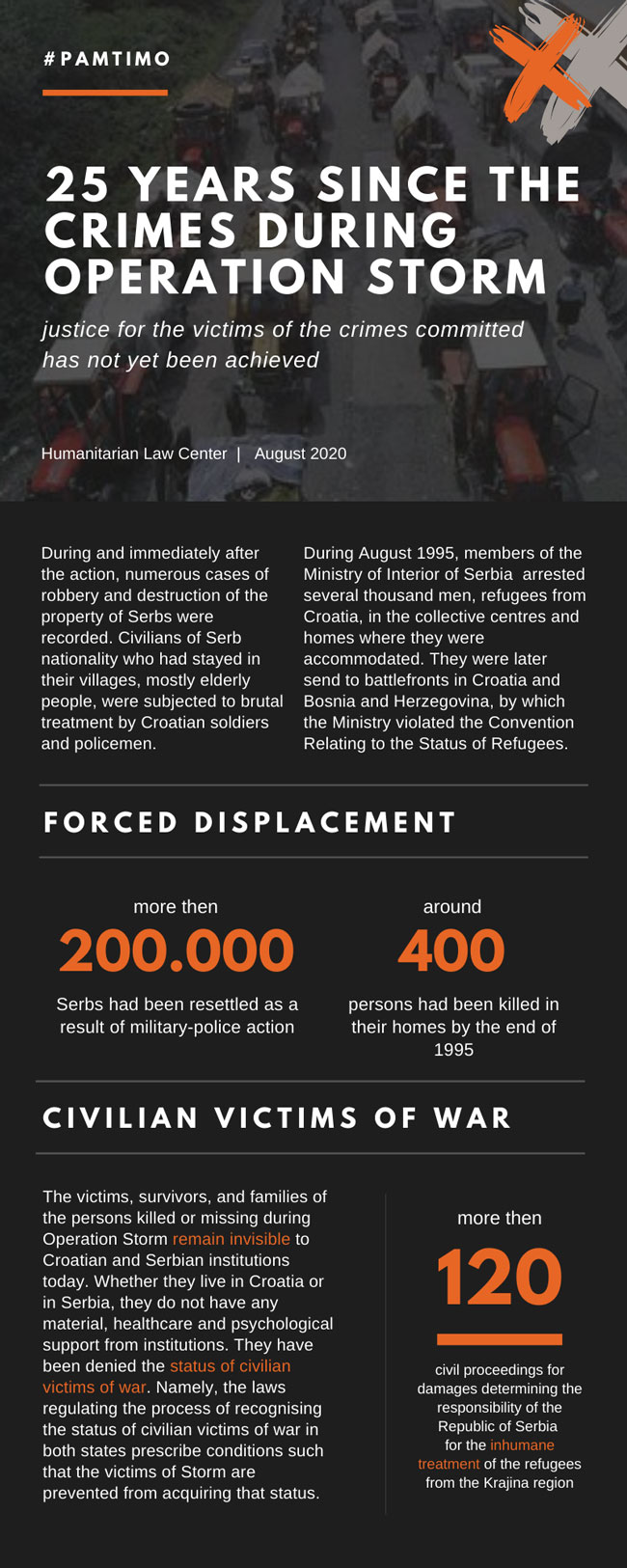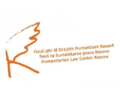The Victims to Become the Concern of the Societies and Institutions of Serbia and Croatia
 This year marks25 years since the military and police action “Storm” (Oluja), during which Croatian military forces committed numerous crimes against Serbs living in the area of the so-called Republic of Srpska Krajina. Even after 25 years, justice for the victims of the crimes committed has not yet been achieved, responsibility for which must be carried by the institutions of both Croatia and Serbia. While the anniversary of Operation Storm continues to be celebrated in Croatia, ignoring the atrocities committed during and after that action, Serbian state representatives misuse the victims for political purposes during state-sponsored commemorations of the same event. Both states have a legal and moral obligation to change the relationship to the crimes committed during Operation Storm, and to show that the care of the victims and prosecution of those responsible for war crimes is to be a pillar of future reconciliation.
This year marks25 years since the military and police action “Storm” (Oluja), during which Croatian military forces committed numerous crimes against Serbs living in the area of the so-called Republic of Srpska Krajina. Even after 25 years, justice for the victims of the crimes committed has not yet been achieved, responsibility for which must be carried by the institutions of both Croatia and Serbia. While the anniversary of Operation Storm continues to be celebrated in Croatia, ignoring the atrocities committed during and after that action, Serbian state representatives misuse the victims for political purposes during state-sponsored commemorations of the same event. Both states have a legal and moral obligation to change the relationship to the crimes committed during Operation Storm, and to show that the care of the victims and prosecution of those responsible for war crimes is to be a pillar of future reconciliation.
Operation Storm led to the resettlement of more than 200,000 Serbs. During and immediately after the action, numerous cases of robbery and destruction of the property of Serbs were recorded. Civilians of Serb nationality who had stayed in their villages, mostly elderly people, were subjected to brutal treatment by Croatian soldiers and policemen. According to data from the Croatian Helsinki Committee for Human Rights, by the end of 1995, about 400 persons had been killed in their homes.
During August 1995, members of the Ministry of Interior of the Republic of Serbia arrested several thousand men, refugees from Croatia, in the collective centres and homes where they were accommodated, thus violating the Convention Relating to the Status of Refugees. Buses drove them to the Serbian Volunteer Guard’s (SDG) camp in Erdut. SDG members abused and humiliated them, accusing them of being traitors and then having them referred to the battlefront in Croatia and Bosnia and Herzegovina. Dozens of forcibly mobilised refugees lost their lives on the front lines. Courts in Serbia have so far brought more than 120 judgments determining the responsibility of the Republic of Serbia for the inhumane treatment of the refugees from the Krajina region.
In 2008, before the International Criminal Tribunal for the Former Yugoslavia (ICTY), Ante Gotovina, Commander of the Croatian Army of Split and overall commander of the Operation Storm in the southern part of Krajina region; Ivan Čermak, Commander of the Knin Garrison and Mladen Markač, Commander of the Special Police of the Ministry of the Interior of the Republic of Croatia, were indicted for crimes against Serb populations during Operation Storm. The first-degree ruling of 2011 sentenced Gotovina and Markač to 24 and 18 years in prison respectively, for war crimes and crimes against humanity, while Čermak was acquitted. After the appeal in the following year, Gotovina and Markač were also acquitted of any criminal liability.
The victims, survivors, and families of the persons killed or missing during Operation Storm remain invisible to Croatian and Serbian institutions today. Whether they live in Croatia or in Serbia, they do not have any material, healthcare and psychological support from institutions. They have been denied the status of civilian victims of war. Namely, the laws regulating the process of recognising the status of civilian victims of war in both states prescribe conditions such that the victims of Storm are prevented from acquiring that status. The Government of the Republic of Serbia has not shown its readiness to amend the Law on the Rights of Civilian Invalids of War so that the victims of Storm can also obtain the status of civilian victims of war. In March 2020, the Law on the Rights of War Veterans, Army Invalids, Civilian Invalids of the War and Members of their Families was passed, not recognising victims of Operation Storm as civilian invalids of war; instead, the law retained a previous legal solution.
The state institutions of the Republic of Serbia started commemorating the anniversaries of Operation Storm officially in 2015, jointly with Republika Srpska. That year, the Memorial Day for all Killed and Expelled Serbs was established, making 5 August as the day of mourning. The same year, the first official large-scale commemoration began with the symbolic meeting of Milorad Dodik and Aleksandar Vučić in the middle of the Rača Bridge. A monument is being built this year in the same spot, and it is planned to establish a memorial park at Sremska Rača.
The victimisation discourse that accompanies the state commemorations of Operation Storm represents a political instrumentalisation of victims, and it separates Operation Storm from the wider context of the war in Croatia. In addition to the fact that the victims and their families are invisible to the institutions of Serbia, the commemorations ignore the facts about the forcible mobilisation of refugees on their arrival in Serbia, and how the Krajina refugees were not welcome in Serbia. Furthermore, officials of Serbia and Republika Srpska do not mention the context that preceded Operation Storm such as the ethnic cleansing of the non-Serb population following the siege of large parts of Croatia by various Serbian forces.
Instead of recognition and care for victims, the state authorities in Serbia misuse and utilise the victims of Operation Storm in the nationalist discourses about Serbia’s strength that are characteristic for the official commemorations of the Operation Storm. Meanwhile, the survivors and families of murdered and missing persons are still lacking any rights and support from the institutions.








